Former Manchester United player Mike Phelan shares his memories of the infamous 1993 game against Galatasaray in Istanbul in which Eric Cantona was sent off, Bryan Robson was left covered in blood, and Sir Alex Ferguson learned a lesson about European football
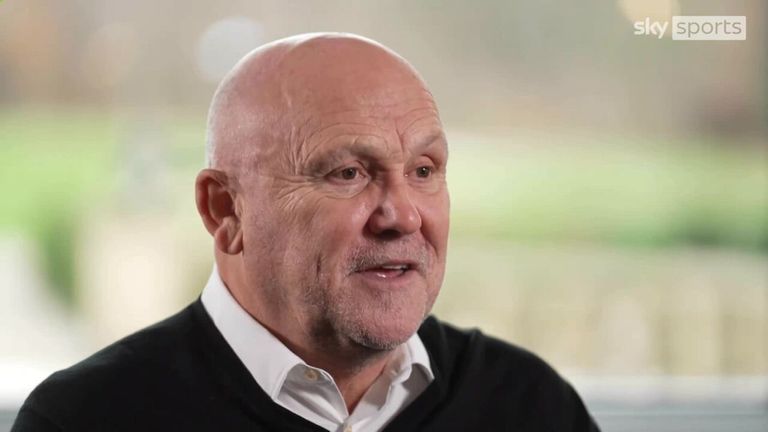
Former Manchester United player and current coach Mike Phelan recalls the infamous trip to Galatasaray in 1993
“It was a bit like a good night out in Burnley, to be fair,” jokes Mike Phelan. He started his career at Burnley but he is discussing the scene of his last big game as a Manchester United player, the trip to Galatasaray in 1993 that is now the stuff of legend.
Sir Alex Ferguson’s Manchester United were competing in Europe’s premier club competition for the first time in almost a quarter of a century. The adventure came to a violent and terrifying end in Istanbul with perhaps the most notorious goalless draw of them all.
Eric Cantona was sent off before being struck by a police officer. Bryan Robson returned to the dressing room covered in blood. The team bus was attacked. Supporters were imprisoned. ‘Welcome to the hell’ read one infamous sign. Most were just glad to leave.
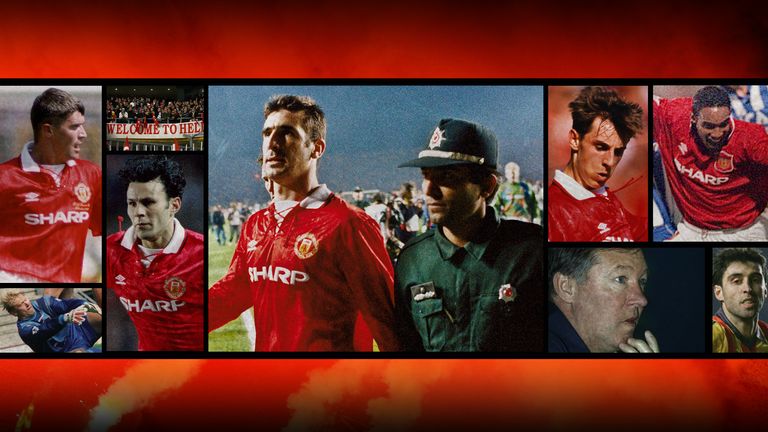
Image: Eric Cantona was at the centre of the drama as Man Utd went out to Galatasaray in 1993
Gary Neville, who came on for Phelan late in the game, still remembers that night in Istanbul as the most intimidating environment he ever played in, claiming he learned more in those 10 minutes than he had in his fledgling career up to that point.
At 32, Phelan was at the other end of the scale but he still agrees.
“I don’t think I had ever experienced that before,” he tells Sky Sports. “You expect atmospheres. You don’t expect it to translate to the field. It was a first. Probably the last. There have been one or two things in domestic football but never to that point where you fear for your safety. It was a big learning curve for a lot of us.
“We knew from the first leg that we were going into a hostile environment. How hostile we didn’t quite know.”
In 1993, United were not yet the behemoth that they would become but the charge had begun. They had ended their 25-year wait for the title by winning the inaugural Premier League and were already well clear at the top of the table in defending the crown.
“We were starting to build at that time, starting to win games consistently, starting to win trophies.” European competition, from which English clubs had been banned between 1985 and 1990, was the target. United had won the Cup Winners’ Cup in 1991.
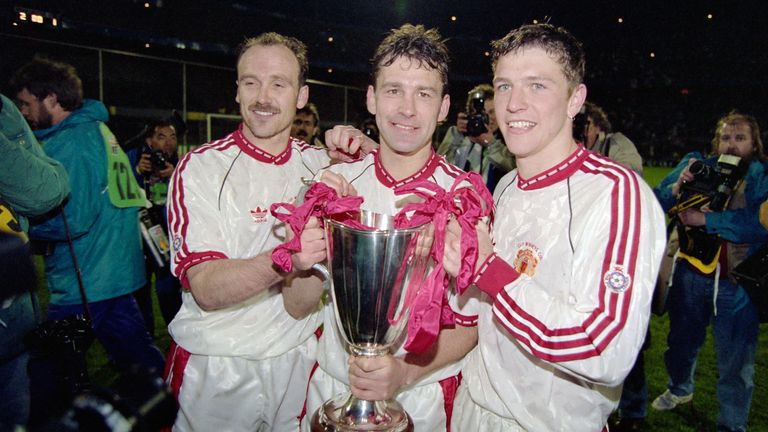
Image: Mike Phelan after winning the 1991 European Cup Winners’ Cup against Barcelona
Now, it was time for a crack at the big one, the Champions League. “That was the next level for us. English clubs were relatively new going back into Europe. We wanted to do well.” But United had to get past Galatasaray over two legs to reach the group stage.
Two goals up inside 15 minutes of the first leg at Old Trafford, there was little sign of the problems or the drama that was to come. But soon after the hour mark, Galatasaray led 3-2 and it needed a late Eric Cantona goal just to salvage a draw in Manchester.
“In the blink of an eye, European football can change,” says Phelan. “A 3-3 for Manchester United at home against a Turkish side was unknown.” Ferguson could not believe it. “I’m in shock. We have a hell of a job on our hands now.” Those words proved prophetic.
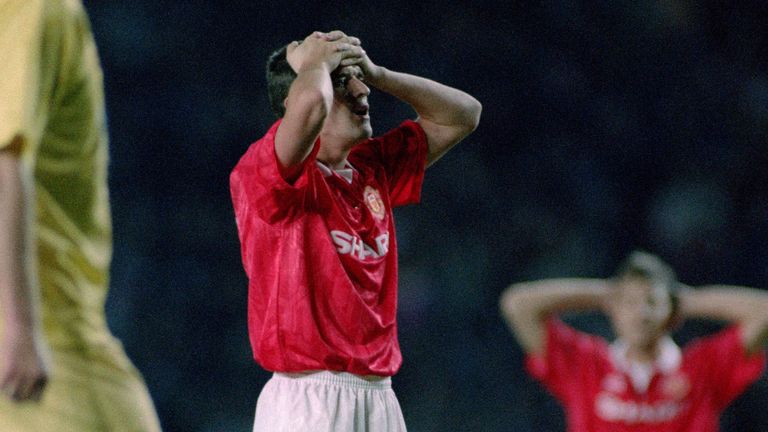
Image: Roy Keane with his head in his hands during Manchester United’s first-leg draw
The intensity of the atmosphere that awaited United in Istanbul became clear immediately upon arrival. “It was very, very hostile when we landed. There were a hell of a lot of Galatasaray supporters. They were banging on the Perspex, all shouting, ‘Kill, kill, kill.’”
The hotel was more pleasant. “An old palace, right on the Bosphorus.” Although Gary Pallister’s recollection of a bellboy there giving him the slitting-of-the-throat gesture reveals the menacing undertone. The night before the game would be a long one.
“There were quite a lot of disturbances going on, players complaining about the noise in the corridors,” says Phelan. “One or two mentioned that their phones kept going off in their rooms. In those days, these weren’t mobile phones, it was the hotel phones.”
But it was the day of the game when the mood really turned.
“It changed. You could tell there was a real serious atmosphere getting on the bus, the crowds outside the hotel. We got to the ground quite early and it was full. Two hours before kick-off and it was bouncing. It was absolutely full. This was a proper game now.”
The game itself was an awkward one. “Quite stop-start.” The away-goals rule meant United were up against it. “We knew we needed to win. We were slightly inexperienced in how we handled that. A lot of the refereeing decision seemed to go to the home team.”
The Ali Sami Yen Stadium was intimidating and noisy but, one protestor storming the pitch aside, there was little sense of physical threat for the players. “We seemed comfortable. Probably the pitch was the safest place to be,” says Phelan. “Or so we thought.”
Cantona’s red card late in the game not only scuppered hopes of a late winner but altered the mood. “It seemed to change. Not just outside the pitch but on the pitch.” Just getting back to the relative safety of the dressing room soon became the big challenge.
“It was a ground where you went down under the pitch, you just disappeared under the surface, and I must admit it was the longest corridor to the dressing room ever. It felt that way anyway. At the final whistle, we disappeared into the trouble.
“It is the first ground I had been to where all the way to the dressing room it was lined with police with batons, helmets and riot shields. You start to think, this is a bit weird, what can happen in a tunnel? And I remember the lights turning off.”
Amid the confusion and the carnage, Cantona wanted to confront the referee but was escorted off the field by a police officer. Robson has since claimed the officer punched Cantona and a shield shoved him into a wall, badly cutting his elbow.
Cantona had to be restrained by his team-mates, apparently keen to take on the whole of Turkey. Things did settle in the end. “Eric was sat in one corner, as angry as angry could be,” says Phelan. “Bryan was in the other corner covered in blood.” Beaten and battered.
“We were pretty down about the result but also because something has happened to one of your team-mates. You get aggressive, you get uptight. We needed to calm down, which we did eventually. But it all kicked off again when we got on the bus.
“As we were on the bus and driving away, at the front of the bus I think a window got smashed. That makes you feel uncomfortable because that should be your safe environment. There were a few rushing around but we managed to get back to the hotel.”
United returned home and promptly won a thrilling Manchester derby at Maine Road that weekend, never coming close to relinquishing their grip on the title. Getting hold of Europe’s biggest prize would take Ferguson and his team rather longer.
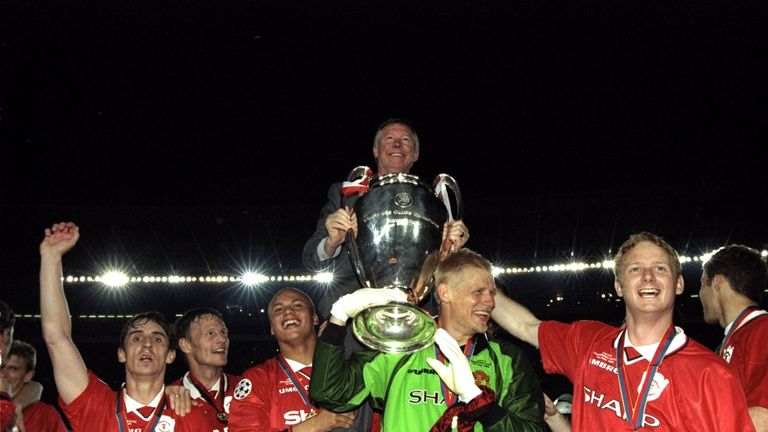
Image: Sir Alex Ferguson finally enjoyed Champions League success in 1999
There was a chastening defeat in Barcelona the following season and two more knockout defeats before they made history in 1999. Phelan was well into his coaching career by then but five of those involved against Galatasaray in 1993 were integral to that triumph.
“I think it was a growing up point for everybody,” he says.
“Lessons were learned. It is another level, the detail is far greater. The refereeing is definitely different. The manager would always say that it only takes a second to score a goal. In Europe, if you blink, if you lose concentration, you can lose a game. Wise words.
“I think it was just about us getting back into the groove. Europe is a different environment, the travelling, the atmospheres. You need to be playing regularly in Europe and I think we were just undercooked. You need to be in it to be able to make progress.”
- Find out more about Sky | Download the Sky Sports App
It is a lesson Erik ten Hag’s United must learn as they prepare to face their own test against Galatasaray in Istanbul. Having already been beaten by the Turkish team at Old Trafford, their hopes of qualification for the next stage are already slim.
It will be no easier against Galatasaray away from home. Just ask those who first made the visit there 30 years ago.
“It will be tough,” says Phelan. “It will be very tough.”
Sourse: skysports.com